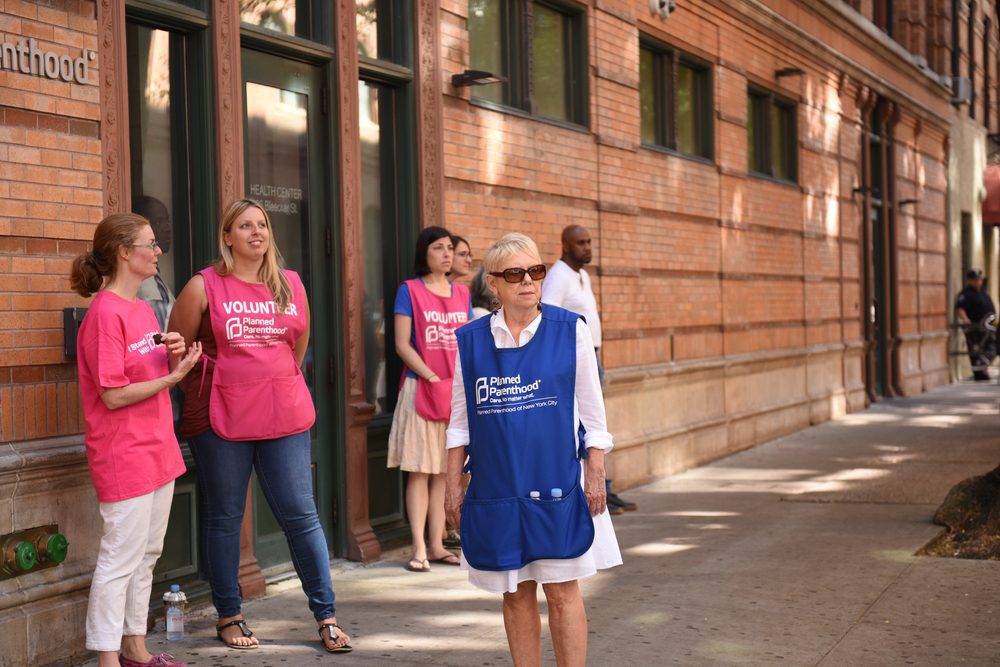
(Photo credit: a katz/Shutterstock)
Planned Parenthood is contracting amid the federal government’s moves to freeze and reduce funding for OB-GYN care across the nation. Four clinics will close in Iowa.
Planned Parenthood announced this month it is closing four clinics in Iowa, news that comes as Republicans nationally are preparing to defund the major provider of reproductive health services like sexually transmitted infection screenings and birth control.
In April, the Trump administration froze $2.8 million in federal Title X funds that helped clinics like those operating in Iowa to provide birth control and cancer screenings. Last week, US House Republicans passed a budget bill that would defund Planned Parenthood by blocking the organization from receiving any federal money, including Medicaid payments for services like STI testing and wellness visits.
Planned Parenthood North Central States CEO Ruth Richardson said in a statement that the organization has been “fighting to hold together an unsustainable infrastructure as the landscape shifts around us and an onslaught of attacks continues.”
The cuts in operation come amid Iowa’s shortage in obstetric care options. Fifty-seven percent of Iowa counties do not have an obstetric facility and 33% of counties have no obstetric providers and no facilities offering obstetric care.
The closures impact clinics in Ames, Cedar Rapids, Sioux City, and Urbandale. Sixty-six staff members will be laid off, and 37 others will need to find new positions at different clinics.
What Iowa looks like after the closures
In practical terms, Iowa will go from six Planned Parenthood clinics to just two—one in Des Moines and one in Iowa City. The Ames clinic was the only Planned Parenthood facility in the state providing abortion procedures. After it closes, the Emma Goldman Clinic in Iowa City will become the only abortion clinic left in the state.
This reduction in services for Iowans comes after Iowa banned most abortions after about six weeks of pregnancy last July. Since then, the number of abortions performed in Iowa has dropped significantly. In the first few months of the ban, abortions in Iowa were down 40%, but travel out of state for reproductive care increased 159%. Since July 2024, the number of Iowans needing abortion funding has tripled, according to the Iowa Abortion Access Fund. It estimates hundreds more patients are now traveling to Illinois, Nebraska, Minnesota, and Kansas for care.
But abortion is just one piece of what these clinics do. In 2024, Planned Parenthood affiliate health centers provided 9.4 million services to more than 2 million patients, according to the group’s annual report. That included 364,600 pap tests and breast exams, 2.2 million birth control services, and 5.1 million STI tests & treatments.
The federal funding puzzle
Title X is a federal program created in 1970 dedicated to providing affordable birth control, cancer screenings, and other sexual and reproductive health care to people with low incomes.
Almost one in five Title X grantees—16 out of 86—had their funding frozen in April, according to KFF, a nonpartisan health research organization. This affects 879 clinics in 23 states, or about 24% of all Title X clinics.
The Trump administration said the freeze was needed to investigate whether these organizations violated federal civil rights law or executive orders targeting diversity, equity and inclusion programs.
Instead of explicitly naming Planned Parenthood, the House’s budget bill targets any nonprofit organization that “is primarily engaged in family planning services, reproductive health, and related medical care,” “provides for abortions,” and received more than $1 million in taxpayer funding in 2024. That description fits Planned Parenthood perfectly—the organization’s latest annual report shows it received nearly $800 million in taxpayer funds from 2023 to 2024.
Why this matters beyond Iowa
What’s happening in Iowa offers a preview of what could unfold nationally if these funding cuts become permanent. Planned Parenthood Action Fund President Alexis McGill Johnson said in a statement the budget bill could force up to half of Planned Parenthood facilities in states where abortion is legal to close. Ninety percent of the health centers at risk of closure are in states where abortion is still legal.
Planned Parenthood North Central States provides sexual and reproductive health care to about 87,631 people across Iowa, Minnesota, Nebraska, North Dakota and South Dakota each year. Over 30% of those patients rely on Medicaid.
KFF estimates that up to 834,000 people may lose access to Title X-funded care if these frozen funds are not released. Those are mostly low-income and uninsured people who depend on Title X clinics for free or reduced-cost contraception and STI testing.
What comes next
The House bill now moves to the Senate, where Republicans hold a narrow majority. The bill passed the House by just one vote, 215-214, with all Democrats and two Republicans voting against it.
Budget reconciliation allows Congress to pass tax and spending changes more easily. With a simple majority of 51 US Senators, Republicans are attempting to bypass the normal 60 vote requirement.
If it passes the Senate and is signed by President Donald Trump, the impact would extend far beyond Planned Parenthood. The bill would make $700 billion in cuts to Medicaid and the nonpartisan Congressional Budget Office estimates it would leave 13.7 million people without healthcare coverage by 2034.
For now, Planned Parenthood’s 15 remaining health centers across the Midwest will stay open, and the organization continues to provide telemedicine services seven days a week. But the math that forced the Iowa closures—frozen federal funds, proposed budget cuts, and restrictive state laws—isn’t unique to the Midwest.
“We remain committed to providing our patients with the essential sexual and reproductive health care that they need,” Richardson said in her statement.
The question is whether the funding will be there to keep that promise.
Zachary Oren Smith writes about politics for Iowa Starting Line. He’s the host of weekly Iowa podcast Cornhole Champions. Subscribe to get the show and newsletter right when it drops Wednesday mornings.
YouTube | Instagram | Twitter | Bluesky | Threads | LinkedIn
Support Our Cause
Thank you for taking the time to read our work. Before you go, we hope you'll consider supporting our values-driven journalism, which has always strived to make clear what's really at stake for Iowans and our future.
Since day one, our goal here at Iowa Starting Line has always been to empower people across the state with fact-based news and information. We believe that when people are armed with knowledge about what's happening in their local, state, and federal governments—including who is working on their behalf and who is actively trying to block efforts aimed at improving the daily lives of Iowan families—they will be inspired to become civically engaged.


Zach Nunn backs extending ACA tax credits two weeks after bashing them
US Rep. Zach Nunn’s position on expiring Affordable Care Act tax credits has been all over the place in recent weeks. Nunn, the Republican...

A new car vs. health insurance? Average family job-based coverage hits $27K
By Phil Galewitz, KFF Health News With the federal shutdown entering its fourth week, spurred by a stalemate over the cost of health insurance for...

We set out to understand Iowa’s cancer crisis. Here’s what we learned
This story first appeared in the Iowa Starting Line newsletter, which you can subscribe to here. ISL’s series The Hot Spot: Investigating Cancer in...

Surviving cancer in Iowa: Caregivers, advocates share their stories
Cancer in Iowa isn’t just about the research studies and the statistics. Real Iowans and their families are behind each diagnosis. Read our first...

We sent Iowans nitrate tests to check their water. Here’s what they found
This story first appeared in the Sept. 30 edition of the Iowa Starting Line newsletter. Subscribe to our newsletter to get an exclusive first look...

How can policymakers help reduce Iowa’s cancer rates?
This story first appeared in the Sept. 23 edition of the Iowa Starting Line newsletter. Subscribe to our newsletter to get an exclusive first look...





